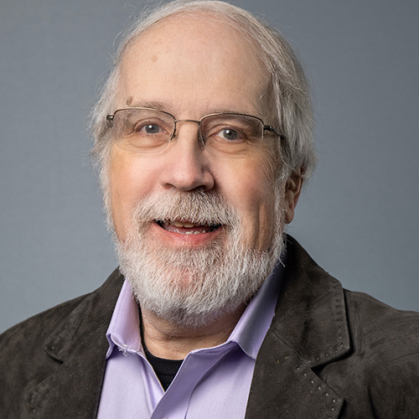
Rutgers Chemist Joins National Academy Of Sciences
David Case, a theoretical and computational chemist at Rutgers University-New Brunswick who has earned international recognition for work that has included making it easier and faster for scientists to develop drugs, has been elected as a member of the National Academy of Sciences.
Case, an emeritus professor in the Department of Chemistry and Chemical Biology in the School of Arts and Sciences, was named one of 120 new academy members and 30 new international members, all selected for distinguished and continuing achievements in original research.
The designation is one of science’s highest honors.
“This recognition reflects Dave’s groundbreaking and sustained contributions to the fields of computational chemistry and structural biology,” said Lawrence Williams, chair of the Department of Chemistry and Chemical Biology.
Case’s work in computational chemistry, where scientists use computer simulations to study how molecules behave, has had a profound impact on drug design, according to his peers.
By producing powerful tools and methods, Case has enabled researchers throughout the world to predict how drugs interact with their targets – the specific molecules or cellular processes drugs are designed to alter to achieve a therapeutic effect.
While creating techniques for simulation, Case has made significant contributions to the field of structural biology, providing insights into the 3D structures and dynamics of the molecules of life.
His research has led to a better understanding of how drugs work at the molecular level.
“Dave has made a lasting impact on the field of biomolecular simulations through the development of innovative computational tools that bridge theory and experiment,” said Darrin York, a Distinguished Professor and Henry Rutgers University Chair in the Department of Chemistry and Chemical Biology and a frequent collaborator of Case’s. “He is known for his creative problem-solving and scientific insight, and his work has not only advanced research but also enabled new ways of understanding complex biological systems.”
One of Case’s many notable achievements is his involvement in the development of the Amber program, originally an acronym for Automated Model Building and Energy Refinement. Characterized by York as “one of the most widely used molecular simulation software suites in the world,” Amber allows researchers to simulate the behavior of complex molecules, including proteins and nucleic acids.
Case’s collaboration with Peter Kollman at the University of California, San Francisco, was instrumental in advancing Amber’s capabilities. After Kollman’s death in 2001, Case took over the leadership of the Amber project, overseeing its development, distribution and expansion into a collaborative effort among dozens of academic labs.
“Today, Amber supports the work of over 30,000 scientists globally and Dave has been a driving force behind its growth, innovation, and continued relevance in the scientific community,” said York. He and Case are also faculty members of the Rutgers Institute for Quantitative Biomedicine.
Case’s journey into the world of chemistry and computation began with a strong family influence in computer science.
Growing up in northeastern Ohio in a family where several relatives worked for International Business Machines Corp., Case was exposed to computer simulations and programming from a young age. His interest in chemistry during high school led him to pursue a degree in chemistry at Michigan State University, followed by graduate studies at Harvard University.
Case said he was delighted to be elected to the academy and praised his working relationship with his Rutgers peers in the 15 years he has spent at the university.
“I feel honored to be listed among so many who have made great contributions to American science,” Case said.
He enjoyed being part of Rutgers’ “vibrant scientific community,” partaking in fruitful collaborations and ready access to the Protein Data Bank.
“Rutgers was really a productive environment for me,” said Case, who has retired to New Mexico. “I had great collaborations there and I enjoyed teaching when I was doing it.”
Case continues to be active in research, driven by his passion for computational chemistry and its applications.
Also elected was Eduardo Sontag, a University Distinguished Professor in the Department of Electrical and Computer Engineering at Northeastern University in Boston. Sontag is an Emeritus Distinguished Professor in the Departments of Mathematics and Computer Science in the Rutgers School of Arts and Sciences.
Those elected bring the total number of active academy members to 2,662 and the total number of international members to 556.
The academy was established in 1863 through an Act of Congress signed by President Abraham Lincoln and provides independent, objective scientific advice to the U.S. government on issues ranging from artificial intelligence to public health.
Explore more of the ways Rutgers research is shaping the future.
https://www.rutgers.edu/news/national-academy-sciences-elects-rutgers-chemist-its-ranks


